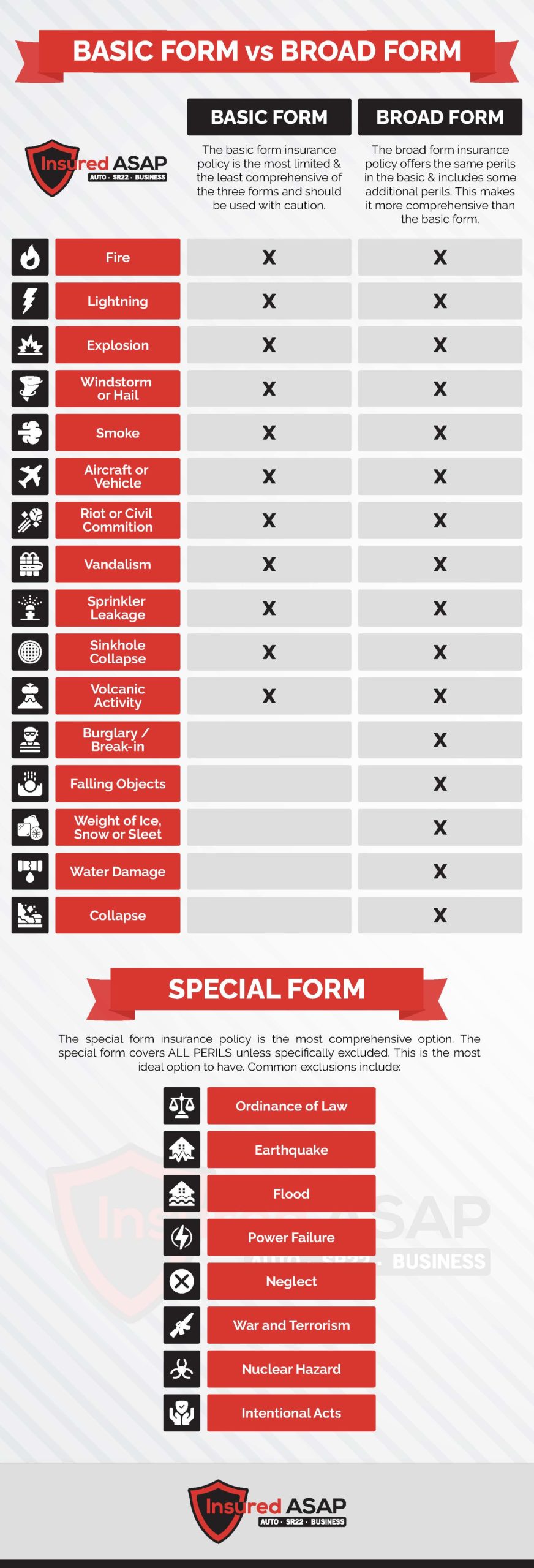When reviewing property insurance for your commercial investment property, small business building, landlord policy, etc., there are often three different levels of property insurance coverage – Basic Form Insurance, Broad Form Insurance & Special Form Insurance.

What is The Difference Between Basic, Broad and a Special Form Insurance Policy?
While reviewing your existing insurance policy, look for the coverage form usually listed on a policy declarations page. If you’re looking over pending insurance quote proposals, the form type will be listed clearly on the application you sign. It’s very common for property owners or small business owners to misunderstand property coverages. This confusion may lead to unforeseen gaps in property coverage.

Basic Form Insurance
The Basic Form property insurance policy is the least comprehensive of the available options. Basic Form policies only include coverage for the specifically named perils. What this equates to that if a coverage is not specifically listed, or named, in the insurance policy, there is no coverage. Basic Form policies are typically very restricted and should be considered with caution. Usually, insurance carriers offer a Basic Form property insurance policy when the property is of old age, in poor condition, under renovation, or if it becomes a vacant building.
The standard coverages that are included in a typical Basic Form insurance policy are:
- Fire
- Lightning
- Windstorm or Hail
- Explosion
- Smoke
- Vandalism
- Aircraft or Vehicle Collision
- Riot or Civil Commotion
- Sinkhole Collapse
- Volcanic Activity
Broad Form Insurance
The next level of coverage offered by carriers on a property insurance policy is the Broad Form policy. The hazards in the Basic Form are carried over and include a few additional named hazards. Similar to the Basic Form policy, a Broad Form insurance policy covers perils on a named basis. This means that if coverage is not specifically named, it’s excluded.
The coverages included in a standard Broad Form policy are the same as in the Basic Form insurance policy plus the following:
- Burglary and/or Break-in damage
- Falling Objects
- Weight of Ice and Snow
- Freezing of Pipes
- Water Damage (Accidental)
- Artificially Generated Electricity
Read More: Your Guide to Illinois Business Insurance Requirements
Special Form Insurance
A Special Form property insurance policy offers the most comprehensive coverage of the three options. It is important to consider that Special Form insurance policies are set up a little different than the previously discussed Basic and Broad Form policies. The greatest difference is that in a Special Form insurance policy, all perils are covered apart from what is listen in the exclusions section.
So essentially, a Special Form insurance policy is read opposite of a Basic or Broad Form insurance policy. Anything that is unlisted is covered, anything listed in the exclusions section is excluded. The Special Form insurance policy is the ideal form for property owners.
There are common exclusions to most Special Form policies. These include:
- Ordinance of Law
- Earthquake
- Flood
- Power Failure
- Neglect
- War
- Nuclear Hazard
- Intentional Acts
It is vital for individuals and small business owners alike to carefully look over and READ any insurance policy. Coverages and exclusions should be examined with a magnifying glass. Overlooking an insurance policy can lead to detrimental consequences in the event of a loss.
Speak to an agent today for more information or for a property insurance quote.






